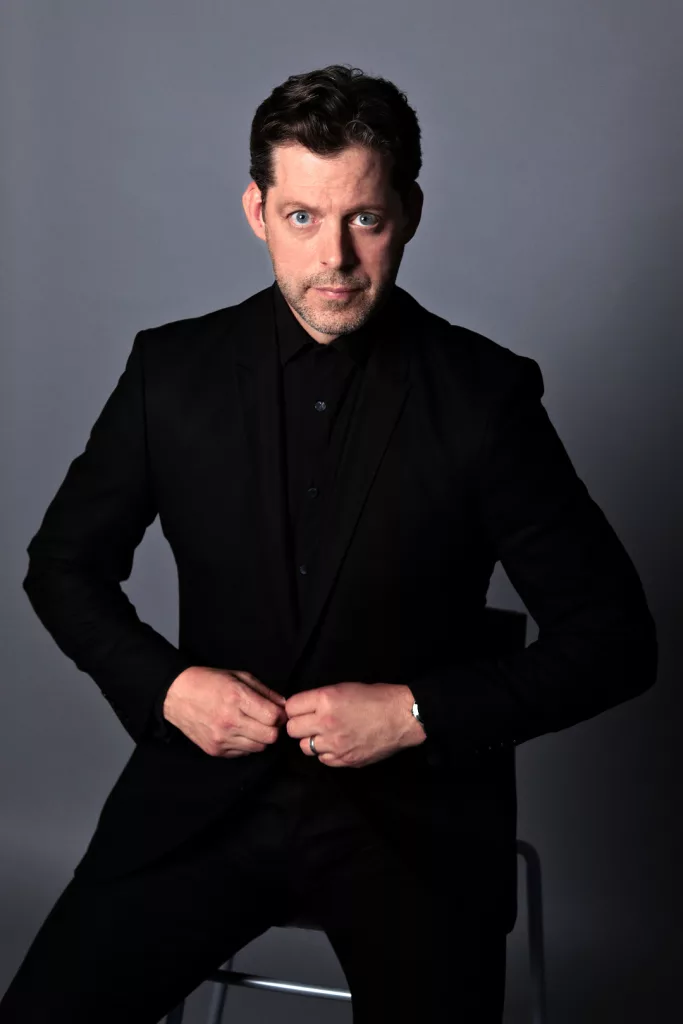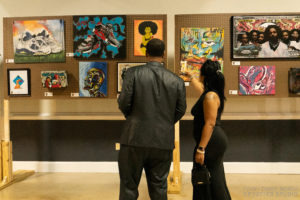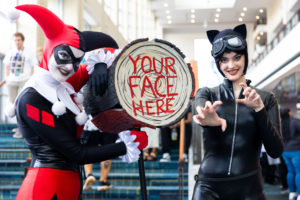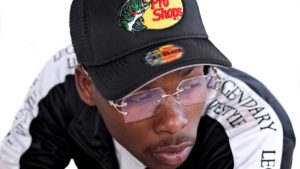In The Studio With Actor And Greensboro Native David Furr
David Furr is a Tony and SAG Award Nominated actor who has performed on Broadway, off-Broadway, on television and film as well as at leading regional theatres throughout the country. He is also known for his voice work and audiobook narration, as well as for passionately engaging with students as an acting coach, sharing practical skills & techniques for the working actor.
Learn More About David Furr At – www.davidfurr.com
Where were you born, and what was your childhood like?
(David) I was born here in Greensboro. And, you know, it’s hard to know what your childhood is like until you’re out of it. But in retrospect, I had a pretty good childhood, you know? I got to ride my bike around to visit friends. And there was always woods to have adventures in. Greensboro is also nicely positioned between the coast and the mountains. We were able to make use of both those things periodically throughout my childhood. I think having access to all those things made it a pretty good childhood. Also, we had a fireplace, a wood-burning fireplace. And my dad would have fires in the fireplace most weekends during the fall and winter. Living in New York City (as an adult), I’d smell a wood-burning fireplace somewhere and I remember texting my dad one night to say thank you for having a fire in our fireplace while I was growing up. Because I realize now that was a pretty good childhood. Not that people don’t grow up with fires in the fireplace. But I realized that something about that is fundamental to who I am.
What was the worst thing that you ever did as a child?
(David) Oh, gosh. I was a pretty good rule follower, probably. I think boys go through a pyromania phase. I don’t know if girls do, too. And I don’t know if all boys do, but the ones I was familiar with. So we were someplace, you know, lighting some matches and burning a G.I. Joe or something like that. And I looked out, and the field we’d just walked through was on fire. So we went out there and, like, we’re stomping all over the place. And then we went home abruptly before any real damage was done. But that might have been my last day of pyromania.
Who is the best-dressed member of your family?
I don’t know. That’s a good question. My wife and I clean up pretty good, but then we have these occasions, too, where we’re forced to clean up pretty well. So most of the rest of my family doesn’t have to do that. They go to church, so they’ll clean up some for that, but it’s a little different. I’ll say my wife. She cleans up great and has a good sense about that. So it’s a little different.


When did you discover that you had a love for the arts?
(David) Well, I started taking piano lessons when I was six. And so I think I had a real drive to jump into that art, specifically music. And so pretty quickly, I was into piano starting at six, all the way to graduating high school. So I was really into music. And I picked up other instruments along the way. In high school, I’d play guitar, and then I picked up dulcimers and mandolins and things like that. And I’d write music and play in bands and things like that. We were never in a particularly good band, but still playing with friends and stuff. And so by the time I went to college, I thought that I was going to maybe be a rock star, or I wanted to be George Martin for the Beatles. You know, he produced their stuff.
And I thought about going to the Berklee College of Music. Not that they invited me to go, but I thought about it. But that was a very jazz-oriented school. So I ended up getting a liberal arts degree up at Appalachian State. And there I discovered theater. I went to my very first audition and got involved in theater and met my friends, or people that became my friends in the theater department.
And so music kind of transitioned to theater. And I was able to do both together sometimes. But by the time I finished college, I’d focused on acting. And I’d still play guitar and play in clubs in New York City when I was up there in the early years before my wife moved up to New York. So I’ve kind of been artistically inclined since I was six. In one way or the other. I just kind of transitioned from music to acting. But I always feel more comfortable in that world than a more traditional business, nine-to-five type world, for better and worse.
What was life like for you during the pandemic?
Well, the pandemic for us started with a bang because we were in New York City in March of 2020. And my daughter was due and I got COVID in March of 2020. So I got COVID and was in isolation in a small little room in our small little New York apartment when we didn’t really know how to keep each other safe at that point. And my wife was due with a baby within a week. And so that was rough because we were still trying to figure out how to get food and how to keep each other safe.

And so that was rough. And my wife had to go deliver completely on her own because I couldn’t go. And also, when she delivered, New York City wasn’t letting anybody but the expecting moms go for safety reasons. And then I was still sick when they got home. So I didn’t get to meet our daughter for a whole week. I mean, I could see her (from a distance). But then they let me come out. I was in isolation. And then it was kind of special because, you know, when you have a child, you want the world to stop for a while just so you can have some time. And that’s what happened in this particular instance. And so once we got through that first piece of high drama, then we got to just be together in a small New York apartment. My mother-in-law was there, too, which was great. But she was there. And she kind of got stuck there because we didn’t want to send her back on the highway during a global pandemic. But it ended up being kind of a sweet time because we were there. And I didn’t feel those pressures of like you’re supposed to be someplace else because there was no place else to be. So we got to just be very close because it was a little New York apartment. But the world stopped, and we had already had our son. And we had this newborn. And so in a way, it afforded us the ability to come check out Greensboro to come down here where our families are and rent for a little while because we didn’t still need to be in New York City. And my son was in remote school. So we could just take him away from New York City and be down here and just stick our toes in the water in Greensboro and see like, well, what do we think about it down here? And so there were a lot of silver linings with the pandemic that I’m grateful for. There were certainly a lot of challenges and it changed our industry in some ways. Some ways that are really good and some ways that we’re still figuring out.
What would you do if the world shut down again?
(David) Well, we’re not in a New York apartment anymore, so if the world shut down again, I would feel better about where we are because we can have a little bit more room to spread out. If the world shut down again, it’d be nice to maybe go camping or travel a little bit as one could during some shutdown. You can’t, you know, in the previous shutdown, you couldn’t just go anywhere, but we were also limited by a newborn, so we couldn’t go for big hikes as much, and I think that’s a good thing. I think if the world shut down again, I would try to find ways to take day trips or more and take the opportunity of time and, I don’t know, maybe it’d be like long camping trips or something like that that don’t take a lot of money but gets you out of your head and out of your house.
What do fans say when they meet you for the first time?
(David) People have to put two and two together to realize that they’ve seen me in something. It was a little different in the Broadway community in New York. Every now and then in New York City, someone would come up in Union Square and say, hey, you know, I saw you in this and, you know, loved that or whatever, but I don’t get stopped by fans too much because I’m not one of those people. I haven’t played Iron Man and things like that to where people are like fans, but usually it’s like, oh, you were that guy in that. Yeah. Oh, I saw that. And then they might want to talk about that particular project or what my life is like in that industry. But, you know, it’s kind of nice because I’m not in a place where people just come up and interrupt my day or interrupt my life. When I would come out of a Broadway stage door, there would be people that had seen the show and they want autographs on playbills and stuff, but then I could walk away and nobody would follow me, which I think is a nice level of fame if you want to use that word because I’d also do plays with people that could not just walk away without people like following them or trying to stop them or stop the car they were getting in. People that just can’t walk around Manhattan. And that never was appealing to me. I like being able to engage with people that want to talk to you and then say goodnight and nobody follows you down the street.
How is acting on Broadway different than filming or TV acting?
(David) Well, the first thing that jumps to mind about the difference between acting on Broadway and on-camera acting is rehearsal. When you’re doing a play of any kind, certainly Broadway, you have four or five weeks of a rehearsal process, and you try things out and dismiss ideas that you don’t want, and you’re collaborating with people, and you’re repeating things and trying them again and trying them again. And for me, relaxation in performance comes from that repetition and from trying things and coming up with ideas. And I think these are choices that feel really good. And then you’re in performance, and you get to do it the next night and the next night and twice on Wednesdays and twice on Saturdays. So after a while, the relaxation that you can feel on stage can be almost complete on some wonderful nights.
On camera, all your preparation is kind of ahead of time, and then you might get a little bit of rehearsal in front of the camera, and then you’ve got to do it, and you get multiple takes, and that’s handy because they can hopefully pick the best takes, but you’re not in charge of the takes that they pick. So you might be trying to tell a story this way, but they’re going to use these takes, and that’s up to the filmmakers. So on stage, you’re a bit more in control of your performance because you’re up there, and it’s you and a live audience, and you have a director that you’re collaborating with. On camera, you’re doing your stuff, and then they pick and choose the moments. But for me, the biggest difference is rehearsal and relaxation. Now, some people would probably feel the opposite about where they get their relaxation. So it’s very individual.
What did you enjoy most on the set of The Gilded Age?
(David) What I enjoyed on the set of The Gilded Age was the people, first of all. So many of that cast, is from the Broadway community, and that’s a community that I’ve been very proud and pleased to be a part of, so just being invited into this list of Broadway dignitaries was very exciting. And then, you’re sitting around between takes, and it’s just a bunch of theater people sitting around, and that’s a very fun community. That’s a great community. That’s what most people do. And then, of course, it’s one of those Julian Fellowes period shows, so the costumes are extraordinary, and you know they’re taking your measurements and having a Master Taylor in Hungary, I think, make you a bespoke, not one bespoke suit but like I don’t know how many I wore in that show. And then every day you’d show up on set and you’d see what all the other people are wearing and kind of going oh my gosh this is amazing. So, the costumes are just a good costume that makes you feel good or makes you feel like your character, which is related but different…it’s still so much fun to put on a costume that either really works for your character or just makes you feel like a million bucks.
How did you train for your role as Cousin Dashiell?
(David) Well, I spent a lot of time with the script and certainly watched the first season of the show also, you know, they have to do a class distinction on how you speak on that show among other distinctions, and so I’d work with the vocal dialect person that they have for the show. And he would say this is how we’re creating class in terms of speaking, and so you’d work on just some of anything that might be different from how you speak. And elevating that to some degree I had to figure out how Dashiell might move differently than I do just in the clothing. Again, that will help with that because when you’ve got collars…and I wasn’t wearing a corset but certainly most of the women are wearing corsets and that will determine how you sit and move so there’s certain rules of etiquette that we had to learn in terms of greetings and tipping your hats to I think everybody. Certainly to women, but I think everybody at least got a nod when you meet them and it was just fascinating to learn the rules of etiquette that we have to play by and even when you’re eating there were rules about like how you hold your spoon and you know you have to lean over then, no ,no you don’t lean over the bowl you’re eating your soup or whatever it is and you have to bring it to you as opposed to leaning over the bowl. But that means you don’t take as many big bites, and you eat very slowly. There were just a lot of fascinating historical protocols to learn, and they were very good about saying, you know, we’re gonna tell you what they are so that you know everybody’s on the same page.

What will the movie business look like in the next five years?
I think the movie business is getting more and more popular. I think it seems like it’s on track to get much more diverse in terms of the casts that you see on screen. I think there was already some push for that, and then George Floyd happened, and it was interesting to see not only how casting kind of hopefully has taken that to heart but also acting training and like seeing acting classes. And I don’t have the answer to this yet, but how training actors, how does that change in terms of the plays that are being taught in acting class and like okay, we’ve been using this canon of work Shakespeare and Ibsen and all that for years and we can still do that, but we need to find an alternative canon that is more reflective of our society. And I think that is also expressing itself in casting and so hopefully in the next five years we’ll see a much more diverse and representative reflection in casts and the romantic comedies and stuff where it used to just be like a white hero and white romantic couple that it’s exploded open a little bit. So the industry is changing in that regard, and I think we all have to kind of go where do I fit in that now, and so I’m hoping that in the five years we’ll see more and more people sort of, you know, years that that shift will stay in place and not just be a temporary like you know how sometimes there’s a temporary reaction to George Floyd, temporary reaction back to the norms but this one feels in my limited experience like maybe a more permanent shift how successful, we’ll see but you know.
How do you feel about the future of film in North Carolina?
I hope, I hope it has a good future it’s been up and down depending on politics I think sometimes I think filmmaking and TV making can get lumped in with Hollywood and I think sometimes politicians are trying to have easy points against Hollywood and they forget that a TV set or a film set has makeup artists and construction people that have to build the sets and drivers and catering and hotels. There’s a whole support industry that is there for you and they know the people to come and make something so when you just, you know, have a gut reaction to, you know Hollywood film and say, let’s you know, get rid of the tax breaks for it. But you forget that there’s a whole bunch of other people that rely on that industry for their work. And so because of that, I think the industry has kind of come and gone and come and gone in North Carolina, along with the political tides. And I hope that it just becomes more of an everlasting permanent fixture here so that people say, hey, this is an industry that brings a lot to this state, both in terms of exposure and in terms of jobs. And that has a real value added for the state above and beyond, you know, you’re not sticking it to George Clooney or Brad Pitt when you do away with a tax break here. You’re sticking it to the drivers and construction people and stuff like that. So I hope it’s just a very predictable undercurrent of North Carolina’s industry. I didn’t mean to get political there, but it’s relevant.
Where is the best place to take a date in Greensboro?
(David) The best place to take a date in Greensboro? I’m afraid I don’t get out too much because of having two young kids. I haven’t taken my wife on a date here yet, but an old friend of mine from high school started a restaurant called Machete that’s very well-regarded here. I think they were James Beard finalists. And I have eaten there with him, and it was super good. So that would probably be one of my first choices. When we have gotten out, we’ve gone to see a couple of shows at the Tanger Center. And that’s a fantastic facility there. I hadn’t been to it until we moved back. And, you know, you can’t go wrong going to see a good show.

Do you believe connections are more valuable than money?
Oh, yes, connections are definitely more valuable than money because I think inherent in making connections is creating opportunities. And some of those are just purely social opportunities. But, you know, without connections, you get fewer opportunities provided to you. And certainly, some of those opportunities are going to be ways that you can make money. So connections are like the battery that drives opportunity. And if you’re prepared for your opportunity, that looks like luck to a lot of people, but it’s just preparation meeting opportunity.
Which pro sports team would you buy if you could?
(David) Which pro sports team would I buy if I could? I’ve always wanted to be into sports. I’ve never been into sports. I like sports movies because the stakes are all built-in. And I like watching finals games when the stakes are right there. Regular seasons, I never had the patience for. If I was going to buy a team, I don’t know. My son and I have watched a little bit of soccer recently. I don’t have a team in mind, but maybe it’d be a soccer team because that looked kind of fun. And then if I owned them, I would maybe I’d see if I could do their workout with them because soccer players, their physique is good, that’s a good one to model. They’re lean and muscular. So I’d buy a team, make them let me train with them. They could handle the soccer part and maybe they’d win. I don’t know.
Would you rather travel in time to the past or the future?
(David) You know, what first pops to mind is the past doesn’t have air conditioning and I like air conditioning. So just based on that and to give you a short answer, I’m going to say the future because air conditioning. That was too easy. Although perhaps it’ll just be a dystopian future in which there’s no air conditioning.
What advice would you provide to your younger self?
(David) The advice I’d provide to my younger self, I guess two things popped into my mind. One is that it’s a long journey, and two, kind of trust that it’s a long journey because it’ll have a bunch of ups and downs, but maybe don’t get too worked up about any particular up or down, and that journey is going to change over time in some unexpected ways. And then another thing that pops to mind is a friend of mine said, do good work and be kind. And I think that’s what I’ve tried to do instinctively, but I just think that’s a good, way to live. And it goes back to what we were talking about with connections too, that doing good work and being kind, it’s just a good way to be. And it hopefully will make people want to work with you again and tell other people, you should work with this person because they do good work and they’re kind, and really what more do you want? So I think it’s a good, simple thing to try to live by.
What should people expect to see from you in the future?
(David) Well, I hope to be engaging with the community here more and I’m also willing to be surprised by what ways that I might engage in the community here. Teaching is something that I want to engage with students, but also I have a particular set of skills, and I don’t know how that might be of value to people in the community. So there are things that I’m open to that I don’t even know about yet. But in terms of acting, you know, I’m always throwing my hat in the ring for movies and television series. And the trend has been, you know, longer parts in TV shows and series regular type of stuff and things in movies. I think that’s the way I see the movies and that’s the world that I’m living in through my New York and Los Angeles agents. So hopefully, if history is any guide, we’ll see more of that kind of stuff.

“Do good work and be kind. I think that’s what I’ve tried to do instinctively, but I just think that’s just a good way to live.”
– David Furr









